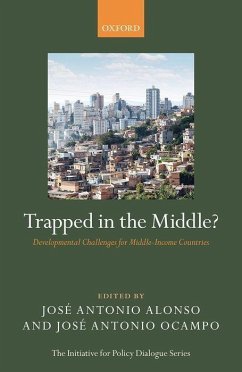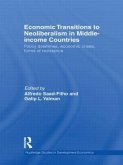Trapped in the Middle?
Developmental Challenges for Middle-Income Countries
Herausgeber: Alonso, José Antonio; Ocampo, José Antonio
Trapped in the Middle?
Developmental Challenges for Middle-Income Countries
Herausgeber: Alonso, José Antonio; Ocampo, José Antonio
- Gebundenes Buch
- Merkliste
- Auf die Merkliste
- Bewerten Bewerten
- Teilen
- Produkt teilen
- Produkterinnerung
- Produkterinnerung
Trapped in the Middle? investigates whether middle-income traps really exist and, in case they do, how these pitfalls are manifested, their causes, what economic policy measures are required to escape from them, and what international cooperation can do to support this process.
Andere Kunden interessierten sich auch für
![Economic Transitions to Neoliberalism in Middle-Income Countries Economic Transitions to Neoliberalism in Middle-Income Countries]() Economic Transitions to Neoliberalism in Middle-Income Countries135,99 €
Economic Transitions to Neoliberalism in Middle-Income Countries135,99 €![Asia and the Middle-Income Trap Asia and the Middle-Income Trap]() Asia and the Middle-Income Trap200,99 €
Asia and the Middle-Income Trap200,99 €![Political Economy in the Middle East and North Africa Political Economy in the Middle East and North Africa]() Rachid MiraPolitical Economy in the Middle East and North Africa172,99 €
Rachid MiraPolitical Economy in the Middle East and North Africa172,99 €![The New Middle Kingdom The New Middle Kingdom]() Kendall A JohnsonThe New Middle Kingdom67,99 €
Kendall A JohnsonThe New Middle Kingdom67,99 €![The Emerging Middle Class in Africa The Emerging Middle Class in Africa]() The Emerging Middle Class in Africa124,99 €
The Emerging Middle Class in Africa124,99 €![Economic and Political Change in the Middle East (Rle Economy of Middle East) Economic and Political Change in the Middle East (Rle Economy of Middle East)]() Elias TumaEconomic and Political Change in the Middle East (Rle Economy of Middle East)114,99 €
Elias TumaEconomic and Political Change in the Middle East (Rle Economy of Middle East)114,99 €![Britain and the Politics of Modernization in the Middle East, 1945 1958 Britain and the Politics of Modernization in the Middle East, 1945 1958]() Paul W. KingstonBritain and the Politics of Modernization in the Middle East, 1945 195899,99 €
Paul W. KingstonBritain and the Politics of Modernization in the Middle East, 1945 195899,99 €-
-
-
Trapped in the Middle? investigates whether middle-income traps really exist and, in case they do, how these pitfalls are manifested, their causes, what economic policy measures are required to escape from them, and what international cooperation can do to support this process.
Produktdetails
- Produktdetails
- Verlag: Oxford University Press
- Seitenzahl: 368
- Erscheinungstermin: 20. Dezember 2020
- Englisch
- Abmessung: 236mm x 161mm x 26mm
- Gewicht: 666g
- ISBN-13: 9780198852773
- ISBN-10: 0198852770
- Artikelnr.: 60742953
- Herstellerkennzeichnung
- Libri GmbH
- Europaallee 1
- 36244 Bad Hersfeld
- gpsr@libri.de
- Verlag: Oxford University Press
- Seitenzahl: 368
- Erscheinungstermin: 20. Dezember 2020
- Englisch
- Abmessung: 236mm x 161mm x 26mm
- Gewicht: 666g
- ISBN-13: 9780198852773
- ISBN-10: 0198852770
- Artikelnr.: 60742953
- Herstellerkennzeichnung
- Libri GmbH
- Europaallee 1
- 36244 Bad Hersfeld
- gpsr@libri.de
José Antonio Alonso is Professor of Applied Economics at the Universidad Complutense de Madrid. Previously, he was Adjunct Professor at the Columbia University (SIPA), General Director of Economic Cooperation at the Instituto de Cooperación Iberoamericana, vice-chancellor at Universidad Internacional Menendez Pelayo, and director of the Instituto Complutense de Estudios Internacionales (ICEI). He was member of the High-Level Group of Wise Persons on the European Financial Architecture for Development (2019), member of the Committee for Development Policy (UN ECOSOC) from 2007 to 2018, and member of the European Advisory Group of the Bill and Melinda Gates Foundation from 2012 to 2014. He is a member of the Consejo de Cooperación para el Desarrollo (Spain). His has published research on growth and development, international economic relations, and financing for development. José Antonio Ocampo is Professor at the School of International and Public Affairs, Member of the Committee on Global Thought, and Co-President of the Initiative for Policy Dialogue at Columbia University. He is also the Chair of the Committee for Development Policy, an expert committee of the United Nations Economic and Social Council (ECOSOC). Ocampo has previously served in a number of positions in the United Nations and the Government of Colombia. most notably as United Nations Under-Secretary General for Economic and Social Affairs. He has published extensively on macroeconomic theory and policy, international financial issues, economic and social development, international trade, and Colombia and Latin American economic history.
* 1: José Antonio Alonso and José Antonio Ocampo: Economic traps and
progress in Middle-Income Countries: An Introduction
* 2: Homi Kharas and Indermit Gill: Growth strategies to avoid the
Middle-Income Traps
* 3: Keun Lee: Innovation and the three detours for economic growth
beyond the middle-income stage
* 4: José Antonio Alonso: Is there an institutional trap in MICs?
* 5: Richard Doner and Ben Ros Schneider: Centripetal politics and
institutional building in existing the middle-income traps
* 6: Mario Pezzini: Citizen¿s raising expectations: A call to rebuild
the social contract
* 7: Christopher Hoy and Andy Sumner: Is there new capacity for
redistribution to end poverty in MICs?
* 8: Juliana Martínez Franzoni and Diego Sánchez-Ancochea: Promoting
universal social policy in MICs
* 9: Rolph Van Der Hoeven: Employment and labour markets in MICs: How
to cope with technological change and global challenges
* 10: Emilio Padilla: Should middle-income countries implement
environmental policies?
* 11: Stephany Griffith-Jones: National development finance in
middle-income countries: The role of national development banks
* 12: Otaviano Canuto, Matheus Cavallari and Tiago Ribeiro dos Santos:
Middle-income countries and Multilateral Development Banks: Traps on
the way to graduation
* 13: José Antonio Alonso and Jonathan Glennie: The disruptive role of
MICs in the development cooperation system: Providers and recipients
* 14: Renato Baumann: Global value chains, Preferential Trade and the
middle-income trap
* 15: José Antonio Ocampo: Middle-income countries and the
international monetary system
progress in Middle-Income Countries: An Introduction
* 2: Homi Kharas and Indermit Gill: Growth strategies to avoid the
Middle-Income Traps
* 3: Keun Lee: Innovation and the three detours for economic growth
beyond the middle-income stage
* 4: José Antonio Alonso: Is there an institutional trap in MICs?
* 5: Richard Doner and Ben Ros Schneider: Centripetal politics and
institutional building in existing the middle-income traps
* 6: Mario Pezzini: Citizen¿s raising expectations: A call to rebuild
the social contract
* 7: Christopher Hoy and Andy Sumner: Is there new capacity for
redistribution to end poverty in MICs?
* 8: Juliana Martínez Franzoni and Diego Sánchez-Ancochea: Promoting
universal social policy in MICs
* 9: Rolph Van Der Hoeven: Employment and labour markets in MICs: How
to cope with technological change and global challenges
* 10: Emilio Padilla: Should middle-income countries implement
environmental policies?
* 11: Stephany Griffith-Jones: National development finance in
middle-income countries: The role of national development banks
* 12: Otaviano Canuto, Matheus Cavallari and Tiago Ribeiro dos Santos:
Middle-income countries and Multilateral Development Banks: Traps on
the way to graduation
* 13: José Antonio Alonso and Jonathan Glennie: The disruptive role of
MICs in the development cooperation system: Providers and recipients
* 14: Renato Baumann: Global value chains, Preferential Trade and the
middle-income trap
* 15: José Antonio Ocampo: Middle-income countries and the
international monetary system
* 1: José Antonio Alonso and José Antonio Ocampo: Economic traps and
progress in Middle-Income Countries: An Introduction
* 2: Homi Kharas and Indermit Gill: Growth strategies to avoid the
Middle-Income Traps
* 3: Keun Lee: Innovation and the three detours for economic growth
beyond the middle-income stage
* 4: José Antonio Alonso: Is there an institutional trap in MICs?
* 5: Richard Doner and Ben Ros Schneider: Centripetal politics and
institutional building in existing the middle-income traps
* 6: Mario Pezzini: Citizen¿s raising expectations: A call to rebuild
the social contract
* 7: Christopher Hoy and Andy Sumner: Is there new capacity for
redistribution to end poverty in MICs?
* 8: Juliana Martínez Franzoni and Diego Sánchez-Ancochea: Promoting
universal social policy in MICs
* 9: Rolph Van Der Hoeven: Employment and labour markets in MICs: How
to cope with technological change and global challenges
* 10: Emilio Padilla: Should middle-income countries implement
environmental policies?
* 11: Stephany Griffith-Jones: National development finance in
middle-income countries: The role of national development banks
* 12: Otaviano Canuto, Matheus Cavallari and Tiago Ribeiro dos Santos:
Middle-income countries and Multilateral Development Banks: Traps on
the way to graduation
* 13: José Antonio Alonso and Jonathan Glennie: The disruptive role of
MICs in the development cooperation system: Providers and recipients
* 14: Renato Baumann: Global value chains, Preferential Trade and the
middle-income trap
* 15: José Antonio Ocampo: Middle-income countries and the
international monetary system
progress in Middle-Income Countries: An Introduction
* 2: Homi Kharas and Indermit Gill: Growth strategies to avoid the
Middle-Income Traps
* 3: Keun Lee: Innovation and the three detours for economic growth
beyond the middle-income stage
* 4: José Antonio Alonso: Is there an institutional trap in MICs?
* 5: Richard Doner and Ben Ros Schneider: Centripetal politics and
institutional building in existing the middle-income traps
* 6: Mario Pezzini: Citizen¿s raising expectations: A call to rebuild
the social contract
* 7: Christopher Hoy and Andy Sumner: Is there new capacity for
redistribution to end poverty in MICs?
* 8: Juliana Martínez Franzoni and Diego Sánchez-Ancochea: Promoting
universal social policy in MICs
* 9: Rolph Van Der Hoeven: Employment and labour markets in MICs: How
to cope with technological change and global challenges
* 10: Emilio Padilla: Should middle-income countries implement
environmental policies?
* 11: Stephany Griffith-Jones: National development finance in
middle-income countries: The role of national development banks
* 12: Otaviano Canuto, Matheus Cavallari and Tiago Ribeiro dos Santos:
Middle-income countries and Multilateral Development Banks: Traps on
the way to graduation
* 13: José Antonio Alonso and Jonathan Glennie: The disruptive role of
MICs in the development cooperation system: Providers and recipients
* 14: Renato Baumann: Global value chains, Preferential Trade and the
middle-income trap
* 15: José Antonio Ocampo: Middle-income countries and the
international monetary system








